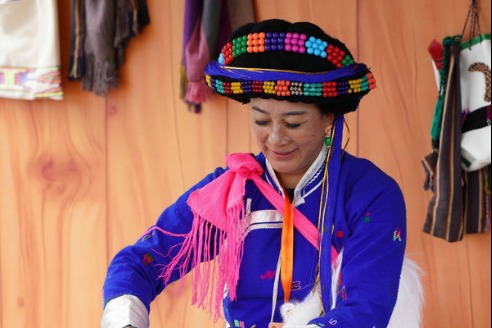Ancient Chinese poem touches heart of student from Mali

About 1,200 years ago, Yuan Zhen lamented in one of his poems that people tend to be burdened by too many "temporal affairs" to enjoy the prime of their lives.
One day last year, the Tang Dynasty (618-907) poet's words touched the heart of an African student who felt stressed out trying to juggle multiple academic tasks at Beijing Jiaotong University.
Busy preparing for the midterm review of his dissertation while also working on several other papers, Dra Yasin Amara came across the verse in a calendar featuring ancient Chinese poems that had been given to him by a teacher at the university.
"The poem struck a chord with me. It is indeed not easy being young," the 24-year-old from Mali said.
The postgraduate student, who finds beauty in the "special structure" of ancient Chinese poems, feels connected to the scenes they depict from time to time.
He posted lines written by Li Qingzhao (1084-1155) on his social media account to record his feelings while walking on the campus on a rainy day, and resonated with the grief of poet Su Shi (1037-1101) when a close friend left China, and he realized they would probably never meet again.
Yasin, who has spent more than six years studying in the university's School of Civil Engineering, developed an interest in ancient Chinese literature in his freshman year, when he attended a class introducing chengyu, or Chinese idioms, most of which originated in ancient China and consist of just four characters.
"I very much liked the way that these short idioms can convey such profound meanings in a concise and elegant way," he said.
"Then my interests grew stronger as I took a course about ancient Chinese poems and works written in classical Chinese in my sophomore or junior year." Through learning the traditional Chinese expressions, Yasin has not only improved his proficiency in written and spoken Chinese, but also found "intersections" in the Chinese and Malian cultures.
For example, the Confucian teachings of filial piety and "do not do to others what you do not want done to yourself" are similar to traditional beliefs in Mali, he said.
"If you want to master a language, you need to understand the culture and history behind it … It's an inevitable process," he said in fluent Chinese.
However, mastering Chinese was not an easy process for Yasin, who did not speak any Chinese before he left Mali.
After graduating as a civil engineering student from a high school in Mali's capital Bamako, Yasin followed his father's suggestions and decided to study in China, which has a competitive edge in building infrastructure.
"A lot of the infrastructure in Mali was built by Chinese companies," he said.
Yasin arrived in China for the first time at the end of 2016, and spent several months in language training classes before starting his undergraduate study at Beijing Jiaotong University in September 2017.
But the language barrier remained a problem.
During the first year at the university, Yasin found it hard to follow lecturers, especially those who spoke with an accent.
The major-specific knowledge taught in the classes was also difficult to understand, partly due to his limited Chinese vocabulary.
To solve the problem, he took notes of the difficult parts in his classes, spent a large amount of time in consultations with his teachers and discussions with his Chinese classmates, and often studied with his friends in the library and classrooms until closing time.
He said the process was so slow and painful that he sometimes questioned his decision to study in China.
But the hard work paid off. In March 2021, Beijing Jiaotong University announced that six of its foreign students, including Yasin, had been awarded the title of "outstanding international students in China" for the year of 2020 by the Ministry of Education.
Yasin has now fully adapted to living and studying in China.
He has traveled to a number of places, and was deeply impressed by a trip to Longnan, in Northwest China's Gansu province, in January last year, when he was invited to spend Spring Festival with a Chinese friend's family.
Yasin said it was the traditional Chinese festive culture he experienced that made the trip special.
He saw many locals visit relatives and neighbors to pass on festival greetings and have a chat, reminding him of how people in his hometown in Mali like to visit their neighbors and ask about their day.
"Every home I visited offered me tea and snacks, such as peanuts and melon seeds, and refilled my cup every time I drank up my tea," he said.
Yasin said he discovered a side of China that he had never seen before:"It felt like coming home."
He was also amazed by the development of modern China on his trips to Southwest China's Guizhou province, where he visited the Pingtang Grand and Baling River bridges.
Covered by karst landforms, Guizhou has built about 28,000 highway bridges, spanning 4,400 kilometers.
"Not only were they built under challenging geological conditions, but they were built like an artwork," said Yasin, who is majoring in highway engineering. "This is highly commendable and worth learning from."
Yasin attributed China's success in infrastructure to its system, which guaranteed high-speed construction, and integrated advanced technologies with sound management.
He said China's capacity in infrastructure building has improved the connectivity of African countries through the Belt and Road Initiative.
?
?




































